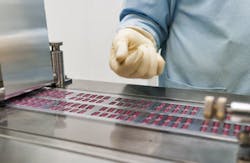Research at Rutgers University School of Engineering aims to develop new ways to manufacture prescription medicines.
The university announced this week that it's ongoing research and development will be expanded thanks to a $6 million contribution from Janssen Pharmaceutical, a unit of Johnson & Johnson.
Scientists at the Rutgers Engineering Research Center for Structured Organic Particulate Systems are working with Janssen and other pharmaceutical companies to help them implement a technique called continuous manufacturing.
According to the university, this technique is more efficient and less expensive than conventional methods for producing tablets. It could revolutionize the industry by enabling pharmaceutical firms to deliver new medications to patients more quickly, while improving quality control and potentially lowering costs.
"Continuous manufacturing represents the future of advanced pharmaceutical manufacturing," commented Fernando J. Muzzio, a professor in the Department of Chemical and Biochemical Engineering. "With this latest funding, our center is now better positioned than ever to serve the scientific community, pharmaceutical companies and the regulatory agencies as the industry moves to this new process over the next decade."
The traditional way of manufacturing tablets involves mixing raw materials in large batches, with a final step of pressing the medicine into the shape of tablets. With the new method, the raw materials are fed into a continuously running process. This requires a smaller facility, minimizes waste and allows for continuous quality monitoring, Rutgers University said.
"Continuous manufacturing is expected to replace conventional batch processing in the pharmaceutical industry as it has in many other industries, from food to steel production," said Muzzio. "But it will take time and extensive collaboration between government and industry, and that is where our work plays such an important role."
